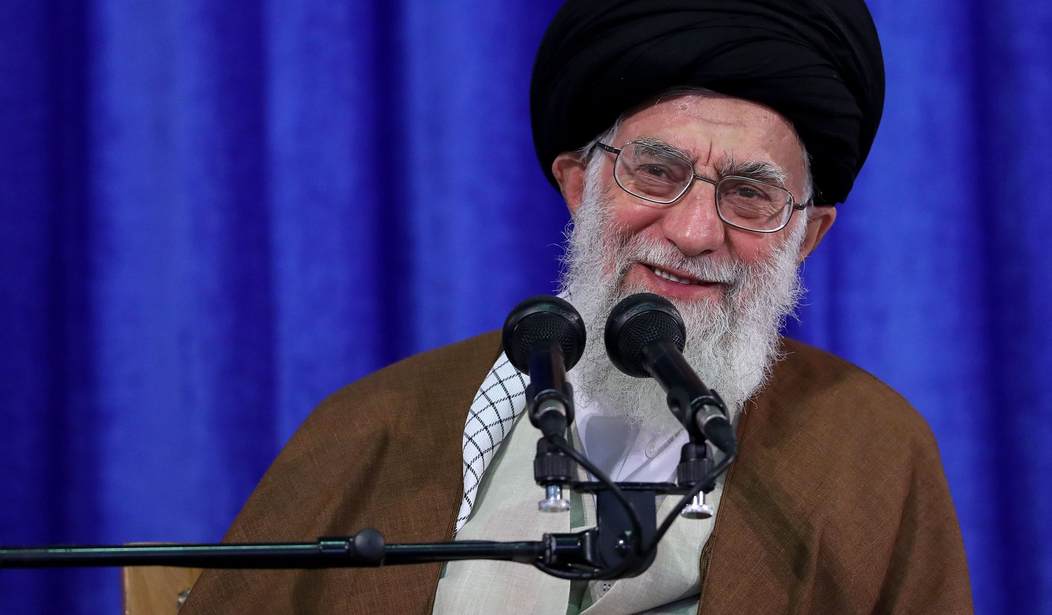Updated January 3, 2019, 10:14 a.m.
After President Donald Trump ordered the airstrike that killed Qasem Soleimani, the leader of Iran’s Quds Force, leaders in Iran gathered to formulate a response. Many warned of a “major escalation” after the airstrike, even though Trump’s action came in response to the storming of the U.S. Embassy in Baghdad, for which the Pentagon blamed Soleimani. Supreme Leader Ayatollah Khamenei vowed “severe revenge” but stopped short of declaring war on the U.S.
“Dear Iranian Nation! Years of sincere, brave efforts fighting against the devils& villainous in the world & yrs of wishing for martyrdom on the path of God finally took the dear Commander of Islam, Soleimani, to this lofty status. His blood was shed by the most barbaric of men,” Khamenei said in a statement.
Dear Iranian Nation!
Years of sincere, brave efforts fighting against the devils& villainous in the world & yrs of wishing for martyrdom on the path of God finally took the dear Commander of Islam, Soleimani, to this lofty status. His blood was shed by the most barbaric of men./1— Khamenei.ir (@khamenei_ir) January 3, 2020
The Supreme Leader praised Soleimani as “an eminent example of a person trained in Islam” who “spent all his life in struggling for God. Martyrdom was the reward for his tireless efforts over the years.”
Khamenei vowed that Soleimani’s “efforts & path won’t be stopped by his martyrdom.” Instead, “by God’s Power, rather a [Severe revenge] awaits the criminals who have stained their hands with his & the other martyrs’ blood last night. Martyr Soleimani is an Intl figure of Resistance & all such people will seek revenge.”
His efforts & path won’t be stopped by his martyrdom, by God’s Power, rather a #SevereRevenge awaits the criminals who have stained their hands with his & the other martyrs’ blood last night. Martyr Soleimani is an Intl figure of Resistance & all such people will seek revenge. /3
— Khamenei.ir (@khamenei_ir) January 3, 2020
“All friends—& enemies—know that Jihad of Resistance will continue with more motivation & definite victory awaits the fighters on this blessed path. The loss of our dear General is bitter. The continuing fight & ultimate victory will be more bitter for the murderers & criminals,” he added. The Supreme Leader declared three days of mourning.
This statement did not address the elephant in the room: whether or not Iran would go to war with the U.S. in response. The statement came hours after initial emergency meetings to plan a response.
“Iran’s National Security Council holds emergency meeting to discuss response to Soleimani killing,” New York Times journalist Farnaz Fassihi tweeted. “IRGC says funeral plans underway. Hezbollah & regional pro-Iran militia ordered on highest alert. Iranian officials across factions warn of major escalation.”
#Iran update:
Iran's National Security Council holds emergency meeting to discuss response to Soleimani killing.
IRGC says funeral plans underway.
Hezbollah & regional pro-Iran militia ordered on highest alert.
Iranian officials across factions warn of major escalation#Iran— Farnaz Fassihi (@farnazfassihi) January 3, 2020
Fassihi also quoted the former commander-in-chief of the Islamic Revolutionary Guard Corps. “Gen. Qasem Sulaimani joined his martyred brothers. But we will take a very strong revenge on America,” the former commander tweeted.
Former Commander in Chief of IRGC:
"Gen. Qasem Sulaimani joined his martyred brothers. But we will take a very strong revenge on America."#Iran #Iraq https://t.co/A6VpTYgkJE— Farnaz Fassihi (@farnazfassihi) January 3, 2020
Fassihi herself gave a grave warning about the consequences of the airstrike. “The gravity of this moment in US-Iran relations can not be overstated. Gen. Sulaimani was the brain of the Islamic Republic, at once revered & feared and a regional folk hero for supporters across the region. Iran sees his assassination as a declaration of war,” she tweeted.
The gravity of this moment in US-Iran relations can not be overstated. Gen. Sulaimani was the brain of the Islamic Republic, at once revered & feared and a regional folk hero for supporters across the region.
Iran sees his assassination as a declaration of war.#Iran #Iraq— Farnaz Fassihi (@farnazfassihi) January 3, 2020
Iran’s foreign minister, Javad Zarif, condemned the airstrike as an “act of international terrorism.”
“The US’ act of international terrorism, targeting & assassinating General Soleimani—THE most effective force fighting Daesh (ISIS), Al Nusrah, Al Qaeda et al—is extremely dangerous & a foolish escalation,” Zarif tweeted. “The US bears responsibility for all consequences of its rogue adventurism.”
The US' act of international terrorism, targeting & assassinating General Soleimani—THE most effective force fighting Daesh (ISIS), Al Nusrah, Al Qaeda et al—is extremely dangerous & a foolish escalation.
The US bears responsibility for all consequences of its rogue adventurism.
— Javad Zarif (@JZarif) January 3, 2020
The National Iranian-American Council (NIAC), which has corresponded with Zarif and has been accused of being Iran’s lobby in the U.S., also warned that the airstrike against Soleimani “will be viewed as an act of war in Tehran.”
“The assassination of IRGC Quds Force Commander Qassem Soleimani is a profoundly reckless move that will be viewed as an act of war in Tehran,” NIAC President Jamal Abdi said in a statement.
“Iran is a nation of 80 million innocent people, most of whom do not want war and oppose the actions of their own government,” he added. “There is no Congressional authorization for a war with Iran, and the legal authority for this assassination on Iraqi soil is dubious at best. Soleimani himself has blood on his hands, yet that is neither an authorization for a war nor a just cause for starting one. Moreover, there is a fierce nationalist streak in Iranian politics, and Soleimani himself polled as one of the most popular figures within his country.”
Abdi called on “leaders in Washington and Tehran to halt the escalation spiral, invite in intermediaries and negotiate their differences before it is too late and a regional war is upon us.”
Some American Democrats also attacked Trump for the airstrikes, 2020 candidates prominent among them.
Sen. Chris Murphy (D-Conn.) acknowledged that “Soleimani was an enemy of the United States.” He did warn, however, that Trump may have lacked the legal authority to carry out the strike. “The question is this – as reports suggest, did America just assassinate, without any congressional authorization, the second most powerful person in Iran, knowingly setting off a potential massive regional war?”
Soleimani was an enemy of the United States. That’s not a question.
The question is this – as reports suggest, did America just assassinate, without any congressional authorization, the second most powerful person in Iran, knowingly setting off a potential massive regional war?
— Chris Murphy (@ChrisMurphyCT) January 3, 2020
Rep. Ilhan Omar (D-Minn.), who has hired at least one former NIAC staffer, built on Murphy’s assertion. “So what if Trump wants war, knows this leads to war and needs the distraction? Real question is, will those with congressional authority step in and stop him? I know I will,” she tweeted.
So what if Trump wants war, knows this leads to war and needs the distraction?
Real question is, will those with congressional authority step in and stop him? I know I will. https://t.co/Fj9TMossEW
— Ilhan Omar (@IlhanMN) January 3, 2020
Sen. Ted Cruz (R-Texas) responded to Omar by citing Department of Defense reports on Soleimani’s death toll against American service members. “According to the Obama Department of Defense, Qasem Soleimani was a terrorist directly responsible for the murder of over 500 US service men & women. Why are congressional Dems outraged that he’s finally dead?” Cruz tweeted.
According the the Obama Department of Defense, Qasem Soleimani was a terrorist directly responsible for the murder of over 500 US service men & women. Why are congressional Dems outraged that he’s finally dead? See more: https://t.co/7MrD4tyM5y https://t.co/cKYSPLSLmj
— Ted Cruz (@tedcruz) January 3, 2020
Sen. Marco Rubio (R-Fla.) noted that “Iran has been attacking Americans for years & was planning more attacks in the near term via various proxies. Because they believed our threats of retaliation was idle talk.”
FICTION: Strike on Soleimani is the reason Iran will now unleash attacks on Americans
FACT: Iran has been attacking Americans for years & was planning more attacks in the near term via various proxies. Because they believed our threats of retaliation was idle talk.
— Marco Rubio (@marcorubio) January 3, 2020
Indeed, the strike on Soleimani did not come out of a vacuum. The Iran-backed Iraqi militia Kata’ib Hezbollah began the escalating tensions with a rocket attack on a U.S.-led coalition base on December 27. That attack killed a U.S. contractor and left many American and Iraqi personnel wounded. According to the Pentagon, Soleimani ordered that attack.
In response, America launched airstrikes against the militia, killing 25 militiamen. In retaliation, the militiamen stormed the U.S. Embassy in Baghdad, invading American soil. The Pentagon claimed that Soleimani “approved the attacks on the U.S. Embassy in Baghdad that took place this week.”
Killing Soleimani is a powerful response to the embassy attack, an attack that arguably constituted an act of war.
According to the Pentagon, “General Soleimani was actively developing plans to attack American diplomats and service members in Iraq and throughout the region. General Soleimani and his Quds Force were responsible for the deaths of hundreds of American and coalition service members and the wounding of thousands more.”
Pentagon sources told Newsweek‘s James LaPorta that Trump authorized the airstrike under 10 U.S. Code section 127e, support of special operations to combat terrorism.
If the Pentagon is correct and Soleimani orchestrated the invasion of the U.S. Embassy, the airstrike against him is proportionate. If war comes, it will be the fault of Iran, not Trump.
Follow Tyler O’Neil, the author of this article, on Twitter at @Tyler2ONeil.









Join the conversation as a VIP Member